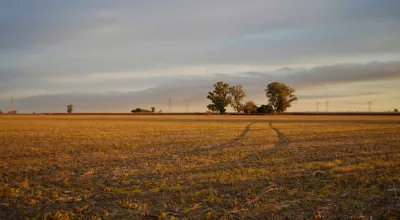
Five Tips For Beginning Farmers
New to farming? Want to learn how to start a farm? If you’re looking to break into the industry, these five tips will help you gain the insights you need to succeed!
1. Get experience.
Farmers need to think like businesspeople, and the best way to see this in action is to work for a profitable business in the same sector you plan to enter. You’ll learn how to plan and use resources, to project and measure outcomes. Be leery of internship opportunities, though. If an ag business can’t afford to pay its workers, it may not be the best place to learn.
Even if you grew up on a farm, you can benefit from learning how others make decisions and manage their operations. To find your opportunity, identify a local farm similar to what you envision for yourself and offer yourself as an employee. This experience will also demonstrate the level of work required, which is especially important for those new to the industry and shows a potential lender your knowledge and commitment.
2. Save money.
Unlike many other businesses, farming is a cyclical industry. It takes upfront financial commitments each year to get a crop planted or animals purchased, and the payoff is sometimes much later with harvest and sale of your product. Learning the discipline of saving for a specific future goal, such as renting your first piece of ground, is good training for the seasonality of a farming cash flow. For lenders, proving that you can pull together adequate capital is a key step in instilling trust that you will be able to adjust your lifestyle to accommodate the different demands of agriculture and ultimately repay any funds you borrow.
3. Develop a cash-flow budget.
Developing a cash-flow budget is a key step in planning for your new farm and for helping a lender see you as a sound investment. A simple, one-page budget should show an entire year’s anticipated income and expenses, including your own salary and your anticipated profitability, and is a powerful tool to bring to a lender when you’re looking for capital. You can work on your cash-flow budget even as you’re working for someone else. To get started, try using the crop and livestock budget templates from Penn State Extension.
4. Create a business plan.
A business plan demonstrates that you know what you’re getting into, including understanding the time, budget and resources you’ll need. For beginning farmers, simply outlining the business plan is a good place to start, with the expectation that you’ll fill in any blanks as you learn more.
The business plan is the document that will help others, including lenders and your family, feel confident in supporting you. Here’s a business plan template from Penn State Extension to help you get started. Our business consultants are here to guide you through the process, and industry organizations can also offer guidance in outlining your plan.
5. Start a networking plan.
As a farmer, you’ll wear many hats – producer, marketer, salesperson and controller, CEO and HR director. The good news is that you don’t need to do it all alone: There are professionals you can hire to take over most of these roles, and advisers are available to help you improve at all of them. Being able to ask for help is an important tool for expanding your expertise and focusing your efforts.
Identifying who to ask is a process, but you can start with a list of roles or areas of expertise – essentially a list of who you can call on for information, perspective and tips, no matter how small the question. Include everything from your plumber, welder, electrician and tractor dealer to your agronomist, veterinarian, extension officer, accountant and lender. Then, start populating the list with your advisers, who can be paid consultants, vendors, suppliers, customers or neighbors. Ask each adviser for recommendations for other roles on your list until all your networking roles are filled. Also be sure to ask for advice on completing your business plan.
Sources
Gary Matteson, Senior Vice President, Beginning Farmer Programs and Outreach, Farm Credit Council
Horizon Farm Credit

























